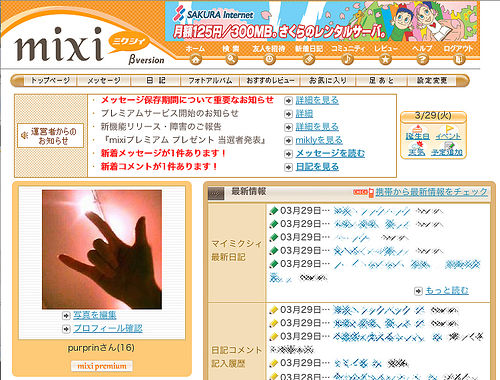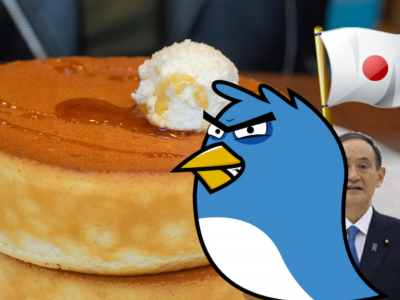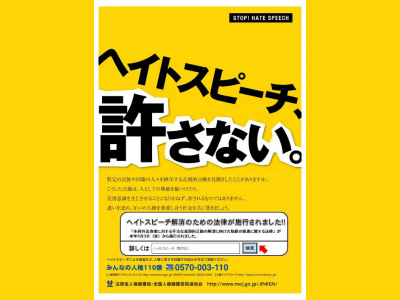Japan's hugely popular social networking site Mixi is in hot water this week after news [ja] that a proposed revision to its Terms of Use (ToU), to become effective as of April 1st, will force its users to agree to grant Mixi no-royalty, non-exclusive rights over all content published on the site, retroactively applicable to all content uploaded before the changes to the ToU. This means that Mixi can potentially use any content on its servers (including messages sent through its messaging service), ignoring access controls on such content, and potentially profit from it.

Mixi (photo by Flickr user purprin)
Blogger fukamimi translates the most controversial part of revisions to the ToU, Article 18:
By agreeing to the ToU (which all users implicitly do by continuing to using the service):
1. Users grant Mixi a no-royalty, non-exclusive rights (of replication, broadcasting, public transmission, display, distribution, translation, alteration, etc) to any content uploaded onto Mixi servers.
2. Users agree not to assert their moral rights against Mixi. [Moral rights include the right of attribution, the right to have a work published anonymously or pseudonymously, and the right to the integrity of the work. source:Wikipedia]
(Or as Matt Alt at AltJapan put it: all your content are belong to us.)
Response to revision was swift and decisive, with forums [ja] and blogs [ja] expressing everything from confusion to outrage. While Mixi has since posted a note (viewable only to Mixi users) stating that it has received many comments and is currently investigating possible changes to the above clause, this may not be enough to stem the flow of users leaving its service. Blogger tek_koc writes:
上の文をかみ砕いて説明すると、mixi上に書いた文章や写真はmixi側で勝手に本にしたりするかもしれないよ。しかもそれは無償でだよ、改変もするかもよ、ということになります。
コミュニティ経由で人の日記を見てみると、熱心に書いている人が本当にたくさんいる。
小説家を目指してのオリジナル作品、自分のイラスト、プライベートなことから、テキストサイトのような面白長文など、本当にたくさんです。
そういうのを見るたび、いつもブログやサイトでやった方がいいと思うけどなぁと思ってはいたものの、余計なお世話だろうと口を噤んできました。でも、mixi側が改めてこんな規約にしたのだから、はっきり言うよ。mixi日記に何かを真面目に書くのはあまりにももったいない。
Many bloggers speculated on possible profit-driven motives for the revision to the ToU, some questioning the wisdom of a money-making strategy based on selling “crowdsurfed crowdsourced content”. Blogger k-ino picked out three main reasons for the move:
mixiがなんでいきなりこういった行動をとったのか。考えられるのは、
- 広告ビジネスの次を目指して、人気のあるコミュニティの内容などで儲ける。
- 未成年の飲酒喫煙など、問題が生じる日記の削除が目的
- コンテンツを抱え込みたい
- Aiming at the next stage after the advertising business, they hope to earn money from the contents of popular communities.
- They aim to eliminate [online] diaries that create problems such as those of underage drinking and smoking.
- They want to hold and dominate [online] content.
Well-known lawyer and blogger Ogura Hideo (小倉 秀夫) [ja], meanwhile, blogging at benli, cites various parts of Japan's Copyright Law in tackling legal aspects of the controversial revised agreement:
mixi騒動に関して気になったことの一つに、「公表権」についての一般の誤解というのがあります。
公表権とは、その著作物でまだ公表されていないもの(その同意を得ないで公表された著作物を含む。以下この条において同じ。)を公衆に提供し、又は提示する権利をいいます(著作権法第18条第1項)。つまり、著作者の同意を得て公表された著作物については、著作者は公表権を行使することはできません。
従って、mixi内に投稿したコンテンツについて投稿者が公表権を行使しうるかは、この投稿行為が著作権法上の「公表」にあたるのかが問題となります。では、著作権法上の「公表」に関する規定を見てみましょう。
He then cites Clause 2, Article 4 of Japan's Copyright Law (translation courtesy of the Copyright Research and Information Center), which defines the phrase “made public” (公表された) as:
著作物は、第二十三条第一項に規定する権利を有する者又はその許諾を得た者によつて送信可能化された場合には、公表されたものとみなす。
The expression “made transmittable” is explained in Article 2, Clause 1(ix-5) of Copyright Law as “putting in such a state that the interactive transmission can be made by either of the following acts:” (1) “to record information on public transmission memory of an interactive transmission server already connected with telecommunication networks for public use”, and (2) “to connect with telecommunication networks for public use an interactive transmission server which records information on its public transmission memory or which inputs information to itself.” (For full descriptions see the relevant passage of the translated Copyright Law.)
Ogura notes that “interactive transmission” is defined in article 2, Clause 1(ix-4) of same law as:
自動公衆送信 公衆送信のうち、公衆からの求めに応じ自動的に行うもの(放送又は有線放送に該当するものを除く。)をいう。
And that “public transmission” is defined as:
公衆送信 公衆によつて直接受信されることを目的として無線通信又は有線電気通信の送信(電気通信設備で、その一の部分の設置の場所が他の部分の設置の場所と同一の構内(その構内が二以上の者の占有に属している場合には、同一の者の占有に属する区域内)にあるものによる送信(プログラムの著作物の送信を除く。)を除く。)を行うことをいう。
From all these legal definitions, he concludes:
従って、mixiが「閉じた空間」であろうとも、そのコンテンツにアクセスしうる人が「多数人」といえる程のものであった場合には、mixiへの投 稿により送信可能化がなされ、著作権法上の「公表」がなされたということになります。
[…]
では、マイミクが少ない人は大丈夫かというと、そこがまた難しい話です。すなわち、不特定人については少数(極端な場合1人)であっても「公衆」にあたるという見解が広く支持されており、そのような見解を支持する人々の多くは、何をもって「特定」人とするかについて家族に準ずるほどの高度の個人的結合関係を必要とするという見解である場合が少なくありません(私はそういう考え方には反対なのですが。)。このような見解に立った場合、そのコンテンツにアクセスできる人の数が少ないとしても、コンテンツ投稿者と、これにアクセスすることができる人との間に、家族に準ずるほどの個人的結合関係がない限り、投稿=送信可能化=公表ということになり、その時点で公表権を喪失するということになります。
従って、mixi内の投稿について必ずしも著作者が公表権を行使しうるとはそもそも言えないということになります。




2 comments